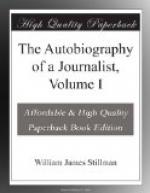“Men called him but a shiftless
youth,
In whom no good they saw;
And yet, unwittingly, in truth,
They made his careless word
their law.
“Men granted that his speech was
wise,
But, when a glance they caught
Of his slim grace and woman’s eyes,
They laughed and called him
good-for-naught.”
There was a gracious indolence in him, an imperturbable serenity, which made proclamation in advance of a truce to all forms of brute collision. No doubt if they had hunted him out for a victim of the political animosity which led to so many tragedies in the early days of our anti-slavery agitation, he would have stood up to the stake as gayly as one of the martyrs of old; but the man’s nature was repugnant to discords, and shrank from combats ruder than those of the printing-press.
All through his career, the religion of humanity is put forward with point and persistence, and the finest of distinctions in morality are maintained,—the so constantly ignored vital difference between the deed and its motive, as in “Sir Launfal:”—
“The Holy Supper is kept, indeed,
In whatso we share with another’s
need;
Not what we give, but what we share,—
For the gift without the giver is bare;
Who gives himself with his alms feeds
three,—
Himself, his hungering neighbor, and Me;”
so that one might have expected from him the life of a social reformer, so keenly did he feel the outrages of civilization. But, possibly from the fact that in those days human slavery in our country summed up all villainies and crimes, and in the war against that he threw all his surplus energy, he never took part in the crusade then beginning against the more familiar iniquities nearer home. But in his constitution there was, I think, another reason why the author of “Sir Launfal,” “Hunger and Cold,” “The Landlord,” and “The Search” should not have emulated Howard or Miss Fry, and have gone into the realms of destitution to relieve its wrongs. He was extremely fastidious, and anything that offended his taste by vulgarity or crudeness repelled him with such force that the work of practical philanthropy would have been impossible to his temperament. The indolence I have above spoken of—which must not be confounded with slothfulness, but is, as the true meaning of the word indicates, the following of the dictates of the temperament, whether in activity or rest—led him to contemplation rather than action.
The refined idealism of his nature, made more subtle by the indulgence of an idolizing circle of relatives and friends, who saw in him the promise of more even than he ever attained, or than was possible to the smooth prosperity of his life, made it impossible for him to thrust himself into the social conflicts, whether of poverty or of politics, though the finest and most exalted passages of his work were not so fine and exalted as his personality; he was better than anything




